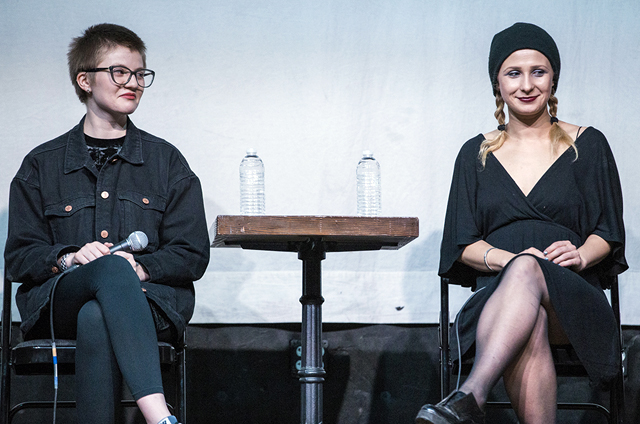Brave young warriors put their case for a more civil Russia Russia.

Pussy Riot members Sasha Bogino (left) and Masha Alyokhina at a panel discussion in Los Angeles ahead of their visit to Australia. PHOTO Carl Pocket, Spaceland Presents
Enormous, harsh, lonely, puzzling, stubborn, crazy. Unique.
I visited European Russia in 1978 during Leonid Brezhnev’s Soviet regime –not for the politics, which thoroughly repelled me, but because I thought that the land that gave us Anna Karenina and Uncle Vanya and the Rite of Spring had to have something going for it.
For all the difficulties in travelling there – not least the surveillance of my every move – I cherish some special memories of St Petersburg (then Leningrad) and Moscow, including a walking tour of Moscow churches, neglected under communism, with a local architecture devotee.
The sudden collapse of Russia’s communist security blanket in 1991 was followed by a spectacular capitalist boom and then a devastating economic crash. With that came institutional failure and the rise of a despot, Vladimir Putin.
The country ought to be on its knees, but it isn’t. The official attribution for this would include strong government and a revived Russian Orthodox Church. But it goes wider and deeper than that.
In Hobart last week, thanks to the wondrous Dark Mofo, a packed Federation Hall audience got a rare insight into Russian resilience in the 21st century in an outstanding documentary film, Act and Punishment, followed by a panel discussion featuring leading figures of Pussy Riot.
Pussy Riot women are usually represented as punk rockers, but music isn’t what they’re really about. Complacency is their target and shock is their weapon, using funny, loud, very public, in-your-face performances about things they believe are wrong in modern Russia.
Three months after getting together in 2011, they donned knitted masks, climbed on to a scaffold in a Moscow subway station and released feathers from pillows on to waiting passengers while urging strong protest action against the rigging of elections for the national duma, or parliament.
A month later they performed outside a prison, in full view of political protesters jailed for protesting electoral fraud, and a month after that let off a smoke bomb in Red Square as they sang, or rather chanted, “Putin has wet himself”.
The next month, during the 2012 presidential elections, came the event they’re best remembered by. The Russian Orthodox Patriarch endorsed Putin as “a miracle from God”. In response Pussy Riot loudly castigated church and state while dancing at the altar of a Moscow cathedral.
For Putin and his Orthodox allies that was a bridge too far. Instead of the normal fine for disorderly behaviour, three of the group’s most prominent members, including Masha Alyokhina who was on stage in Hobart last week, were seized, tried and sentenced to two years’ jail.
One of the three was released on appeal, but the other two, including Alyokhina, served their sentences by working up to 17 hours a day in different labour camps in remote parts of Russia. Far from breaking them, that just seemed to energise them.
On their release these thoroughly unorthodox artists set up MediaZona, an online channel that reports violence in Russian court and prison systems and against lesbian, gay and transgender people. A young female journalist, Sasha Bogino, represented MediaZona at Dark Mofo.
Russia’s strongly patriarchal society is generally indifferent or hostile to LGBTI people. That, plus the murders of 26 journalists in Russia since Putin first became president in 2000 (data from the international Committee to Protect Journalists), tells us Bogino’s job is nothing if not risky.
On stage in Hobart with Aloykhina and Bogino was Alexander Cheparukhin, a mild-mannered older man who gave up a career as an international music festival producer to take on what must be one of the world’s most dangerous management jobs, looking after the affairs of Pussy Riot.
“You are heroes too,” Aloykhina told her Hobart audience, which made us all feel good, except that we weren’t putting our bodies on the line. But hearing such tough, brave, creative people speaking so generously about their lives and art, you tend to feel positive about their prospects.
Pussy Riot, like all Russian artists working for a strong civil society, richly deserved their prolonged standing ovation last week. As does Dark Mofo for bringing them here.
